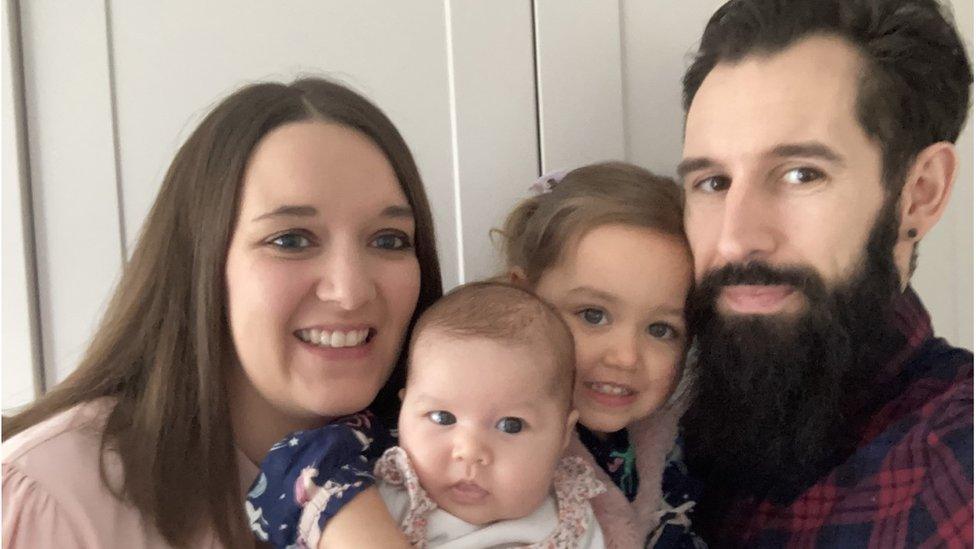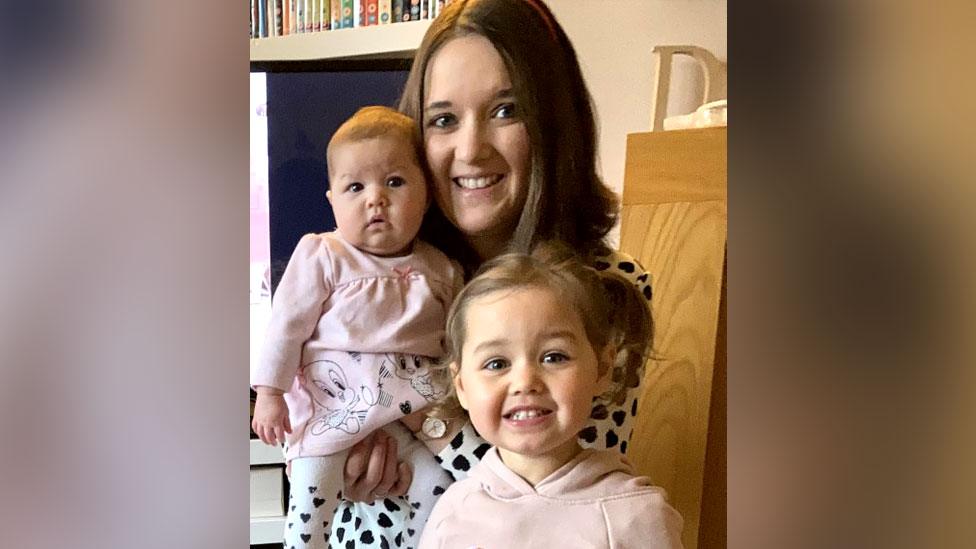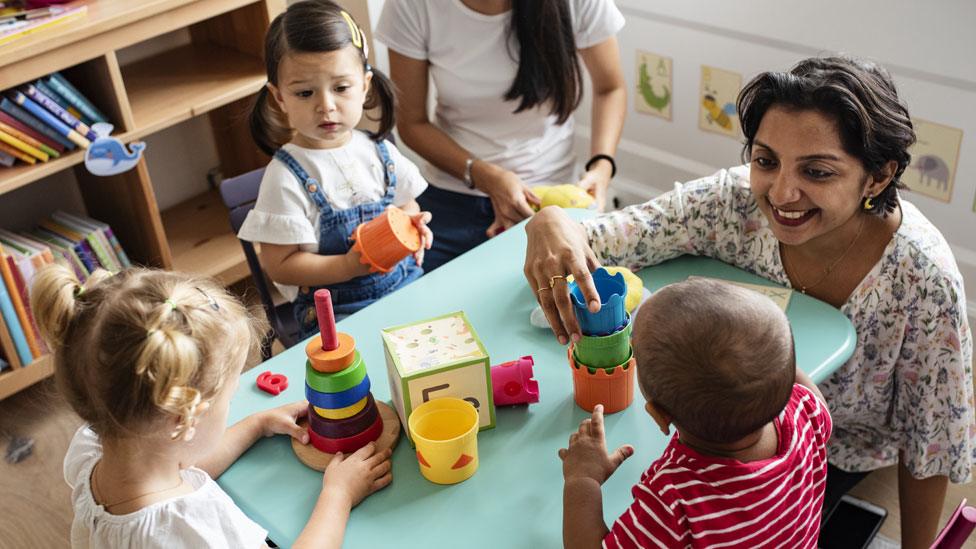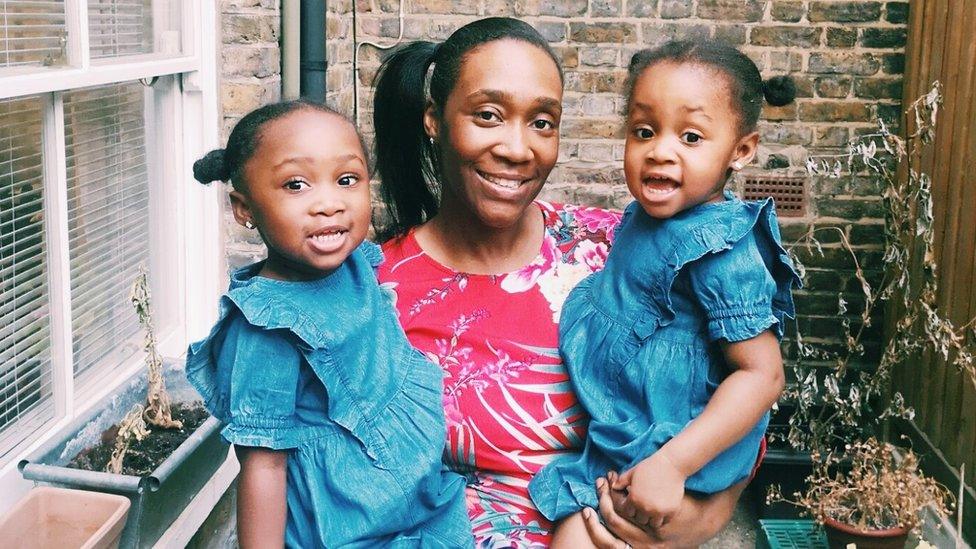Online red books and 'family hubs' to help new parents
- Published

Deborah thinks "family hubs" could help new parents find out more about local services like health visits
New parents will have more co-ordinated access to help and services under plans to improve children's health in England, the government says.
A "family hub" network will be set up and the "red books" used to log babies' health information will be digitised.
Andrea Leadsom, who chaired the government review on early years health, said the plans would identify those families most in need of support.
Labour called them "a smokescreen for a decade of failure on early years".
"Red books" - or personal child health records - are given to parents around the time that their baby is born, and are used to record details like weight, height and vaccinations.
The government said it will bring forward plans to digitise them, meaning they will go online by April 2023.
Local authorities will be asked to produce a single "Start for Life" document for parents with information about support services in their area - from health visits to help quitting smoking.
Under the plans, published as part of a review on Thursday,, external there will also be "family hubs" - centres where parents could access a range of services.
The government says these services could include birth registration, midwifery, health visiting, mental health support and feeding advice.

Finally - the red book gets digitised

Deborah Gibb, a 32-year-old teacher from Bradford, is trying to calm her four-month-old, Freyja, when she picks up the phone. "I think she's started to teethe, which is ridiculously young," she laughs.
She seems to breathe a sigh of relief when I tell her that the red book will be moving online (although that might just be because Freyja has settled down).
"As a mother, going out of the house you pack your entire life with you. But remembering that red book that's in the back of the cupboard?" she says. "It seems ridiculous."
She thinks having a single publication that lists local services would be useful, so long as it's digitised. She was given leaflets "left, right and centre" when she left hospital after giving birth to her older daughter, Eilidh, now three.
"They just go in a pile and you don't get time to read them. What you do spend hours doing is using your phone looking for information in the middle of the night."
She says her job meant she felt reasonably clued up about what support services were available in her area - but many new parents don't.
"I was having a conversation the other day about how I've signed Freyja up for nursery for when I return to work in September. They were like, 'you've already put her name down?'"
She says it is important for first-time parents to have "somewhere to go centrally to get all the information that isn't an intimidating place".

Ms Leadsom, a former cabinet minister, told BBC Radio 4's Today programme the plans would also help identify families who "would go on to have real difficulties" without support.
"What families will see differently is they will receive a joined-up Start for Life offer, which will show them explicitly what services they can get to support them in the period from conception to the age of two," she said.
She said the digitisation of the red books would "make a huge difference".
"For families, they won't have to keep telling their story again and again. For professionals, they will be able to see what's happened to that family to provide them with the support that they need," she added.
Tulip Siddiq, Labour's shadow minister for children and early years, called the plans "a smokescreen for a decade of failure on early years".
She said ministers had spent years "dismantling", external Sure Start, an early intervention policy launched by Labour under Tony Blair to support the wellbeing of children before they started school.
A report by the Institute for Fiscal Studies in 2019 found the Sure Start scheme had a positive impact, but that funding had been cut and 500 sites had closed.
Sir Peter Lampl, head of the Sutton Trust, said there was a "postcode lottery of provision" at present and the pandemic has "highlighted pre-existing inequalities".
"We welcome the renewed focus on this crucial stage in life and the development of the Family Hub initiative as a universal service which will also identify the most vulnerable families," he said.
Angela McConville, chief executive of parents' charity the NCT, welcomed the "commitment to strong, coherent services" to tackle "health and wellbeing inequalities that... have been further exacerbated by the pandemic".
"This focus has been strikingly absent from previous policy and investment, with sometimes disastrous consequences for parents and babies," she said.
Imran Hussain of charity Action for Children also welcomed the plan.
He said children's centres and family hubs "will be more important than ever" following the Covid-19 pandemic, helping to tackle "the growing educational attainment gap" between children from higher and lower socio-economic backgrounds.
Judith Blake, chairwoman of the Local Government Association's children and young people board, said the report "rightly recognises the crucial support provided by councils".
She said the LGA was "keen" to work with Ms Leadsom on the next phase of the review, but stressed that "it will need to be properly resourced".

THE DETECTIVES: Follow the Greater Manchester Police as they track dangerous criminals
SPICE UP YOUR MEALTIMES: TikTok recipes that have taken over our kitchens!

Related topics
- Published4 June 2019

- Published18 March 2021
